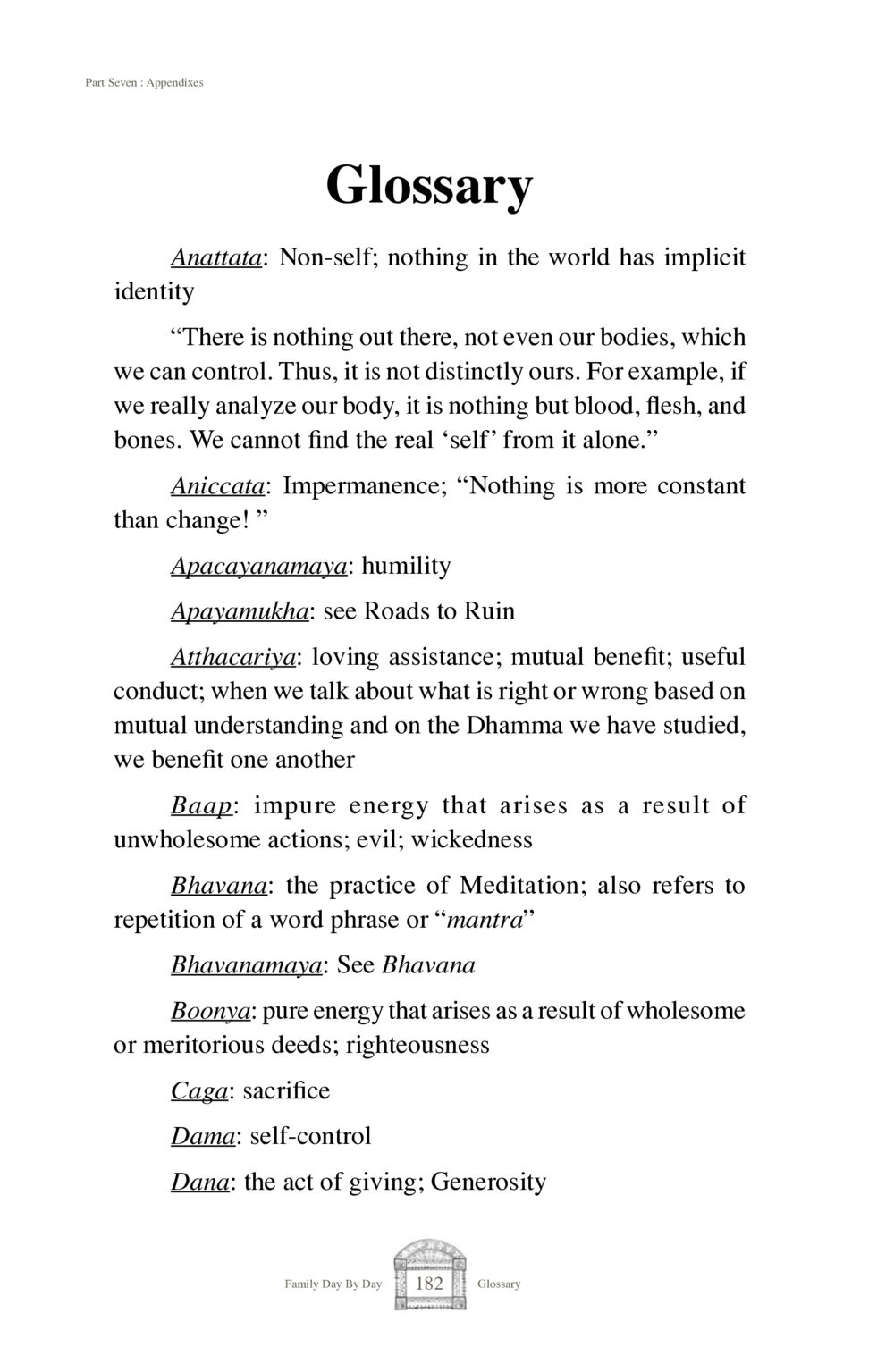Glossary of Key Concepts in Buddhist Philosophy : หน้า 184/216
Family Day By Day : หน้า 184/216 A comprehensive glossary defining essential terms in Buddhist philosophy, including Anattata, Aniccata, and more.
0 ครั้ง

สรุปเนื้อหา
This glossary provides definitions for key Buddhist concepts such as Anattata (non-self), Aniccata (impermanence), and Bhavana (meditation). It emphasizes the understanding that nothing possesses a permanent self, and highlights the significance of loving assistance and mutual benefit in actions based on Dhamma. The terms cover aspects of self-control, generosity, and the nature of energy arising from one's deeds, guiding readers in their understanding of Buddhist practices and ethics. For more, visit dmc.tv.
หัวข้อประเด็น
- Anattata (Non-self)
- Aniccata (Impermanence)
- Bhavana (Meditation)
- Generosity
- Dhamma and Ethics
- Self-control
ข้อความต้นฉบับในหน้า
Part Seven: Appendixes
Glossary
Anattata: Non-self; nothing in the world has implicit
identity
"There is nothing out there, not even our bodies, which
we can control. Thus, it is not distinctly ours. For example, if
we really analyze our body, it is nothing but blood, flesh, and
bones. We cannot find the real 'self' from it alone."
Aniccata: Impermanence; "Nothing is more constant
than change!
"
Apacayanamaya: humility
Apayamukha: see Roads to Ruin
Atthacariya: loving assistance; mutual benefit; useful
conduct; when we talk about what is right or wrong based on
mutual understanding and on the Dhamma we have studied,
we benefit one another
Baap: impure energy that arises as a result of
unwholesome actions; evil; wickedness
Bhavana: the practice of Meditation; also refers to
repetition of a word phrase or "mantra”
Bhavanamaya: See Bhavana
Boonya: pure energy that arises as a result of wholesome
or meritorious deeds; righteousness
Caga: sacrifice
Dama: self-control
Dana: the act of giving; Generosity
Family Day By Day
182 Glossary
หน้าหนังสือทั้งหมด

1

2

3

4

5

6

7

8

9

10

11

12

13

14

15

16

17

18

19

20

21

22

23

24

25

26

27

28

29

30

31

32

33

34

35

36

37

38

39

40

41

42

43

44

45

46

47

48

49

50

51

52

53

54

55

56

57

58

59

60

61

62

63

64

65

66

67

68

69

70

71

72

73

74

75

76

77

78

79

80

81

82

83

84

85

86

87

88

89

90

91

92

93

94

95

96

97

98

99

100

101

102

103

104

105

106

107

108

109

110

111

112

113

114

115

116

117

118

119

120

121

122

123

124

125

126

127

128

129

130

131

132

133

134

135

136

137

138

139

140

141

142

143

144

145

146

147

148

149

150

151

152

153

154

155

156

157

158

159

160

161

162

163

164

165

166

167

168

169

170

171

172

173

174

175

176

177

178

179

180

181

182

183

184

185

186

187

188

189

190

191

192

193

194

195

196

197

198

199

200

201

202

203

204

205

206

207

208

209

210

211

212

213

214

215

216
หนังสือที่เกี่ยวข้อง
Load More
